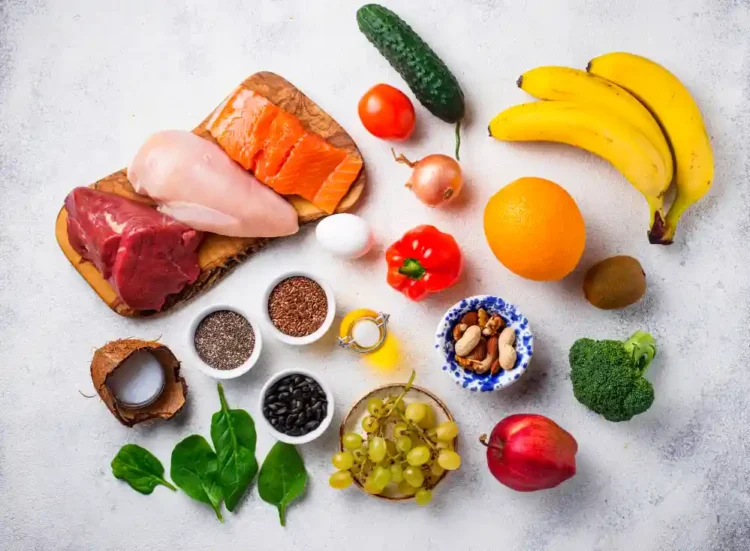Did you know that the right pre-workout nutrition can significantly impact your performance and results? Choosing the right balance of macronutrients, such as carbs and protein, is crucial for fueling your body and maximizing your workout potential. Whether you’re looking to boost energy or promote muscle growth, understanding the role of carbs and protein in pre-workout nutrition is essential.
Key Takeaways:
- Pre-workout nutrition plays a vital role in maximizing performance and results.
- Carbohydrates provide the necessary energy for workouts, while protein aids in muscle building and repair.
- The right balance of carbs and protein can depend on individual goals and the type of exercise.
- Consuming a meal containing carbs, protein, and fat 2-3 hours before your workout is recommended.
- Hydration is crucial for optimal performance, so remember to drink fluids with electrolytes before, during, and after your workout.
The Role of Carbohydrates in Pre-Workout Nutrition
When it comes to fueling your body for a workout, carbohydrates play a vital role. Carbs are the body’s preferred source of energy and are crucial for optimal performance. Let’s explore the importance of carbohydrates before a workout, their role as an energy source, and how they contribute to your glycogen stores.
Carbohydrates are broken down into glucose, which is stored as glycogen in your muscles and liver. During exercise, glycogen serves as a fuel source, especially during high-intensity workouts. Consuming carbohydrates before a workout ensures that your glycogen stores are full, providing sustained energy throughout your training session.
Carbohydrates can be classified as simple or complex. Simple carbohydrates, such as fruits or honey, are quickly broken down and provide a rapid source of energy. On the other hand, complex carbohydrates, like whole grains and legumes, are digested more slowly, providing longer-lasting energy and essential nutrients.
When it comes to pre-workout nutrition, it’s essential to include complex carbohydrates in your diet. They offer sustained energy and nutrient density, supporting your performance and overall health. However, it’s important to note that everyone’s carbohydrate needs may vary based on individual factors such as activity level, goals, and body composition.
If you’re participating in endurance exercises or prolonged workouts, carb loading can be beneficial. Carb loading involves consuming a high-carbohydrate diet in the days leading up to an event or an intense training session. This strategy helps maximize your glycogen stores, ensuring you have plenty of energy to perform at your best.
The Role of Protein in Pre-Workout Nutrition
When it comes to pre-workout nutrition, protein plays a vital role in supporting muscle growth and repair. Consuming protein before a workout can enhance muscle protein synthesis, the process by which the body builds new muscle tissue. To optimize this process, it is recommended to consume 20-30 grams of protein before a workout. This amount stimulates muscle protein synthesis for several hours, maximizing the potential for muscle growth.
There are various sources of protein that can be incorporated into pre-workout meals. Lean meats, such as chicken, turkey, and beef, are excellent options due to their high protein content and essential amino acid profile. Poultry, such as chicken or turkey, is a lean source of protein that provides valuable nutrients needed for muscle repair. Fish, such as salmon or tuna, is rich in omega-3 fatty acids and protein, which can aid in reducing inflammation and supporting muscle recovery. Eggs are also a versatile source of protein, containing all the essential amino acids needed for muscle growth and tissue repair. Plant-based protein sources like beans, lentils, nuts, and soy are excellent alternatives for those following a vegetarian or vegan diet.
“Protein is a key nutrient for muscle growth and repair. Consuming protein before a workout can jumpstart muscle protein synthesis, promoting optimal muscle development.”
In addition to pre-workout protein intake, it is important to consider an individual’s overall daily protein intake for muscle building. The optimal protein intake for muscle growth is typically around 1.6-1.8 grams per kilogram of bodyweight. By spreading protein consumption throughout the day, especially around workouts, individuals can support ongoing muscle protein synthesis.
Finding the Right Balance for Optimal Pre-Workout Nutrition
Achieving optimal pre-workout nutrition requires finding the right balance of carbs and protein based on individual needs and the type of exercise. Carbohydrates provide the energy necessary for workouts, while protein aids in muscle growth and repair.
To fuel your body properly before a workout, it is recommended to consume a meal containing carbs, protein, and fat 2-3 hours before exercising. This combination of nutrients provides sustained energy and promotes muscle function. If you’re short on time, a smaller meal with simple carbs and some protein 30-60 minutes before working out can also be effective.
In addition to balanced nutrition, hydration is a crucial aspect of pre-workout preparation. Drinking fluids with electrolytes before, during, and after workouts helps maintain hydration levels and supports peak performance. Staying hydrated ensures that your body can effectively transport nutrients and removes waste products.
For personalized recommendations tailored to your specific needs, it is advisable to consult a dietitian. They can assess your individual requirements, taking into consideration your exercise intensity, goals, and any dietary restrictions. With their expertise, you can optimize your pre-workout nutrition and enhance your overall performance.











